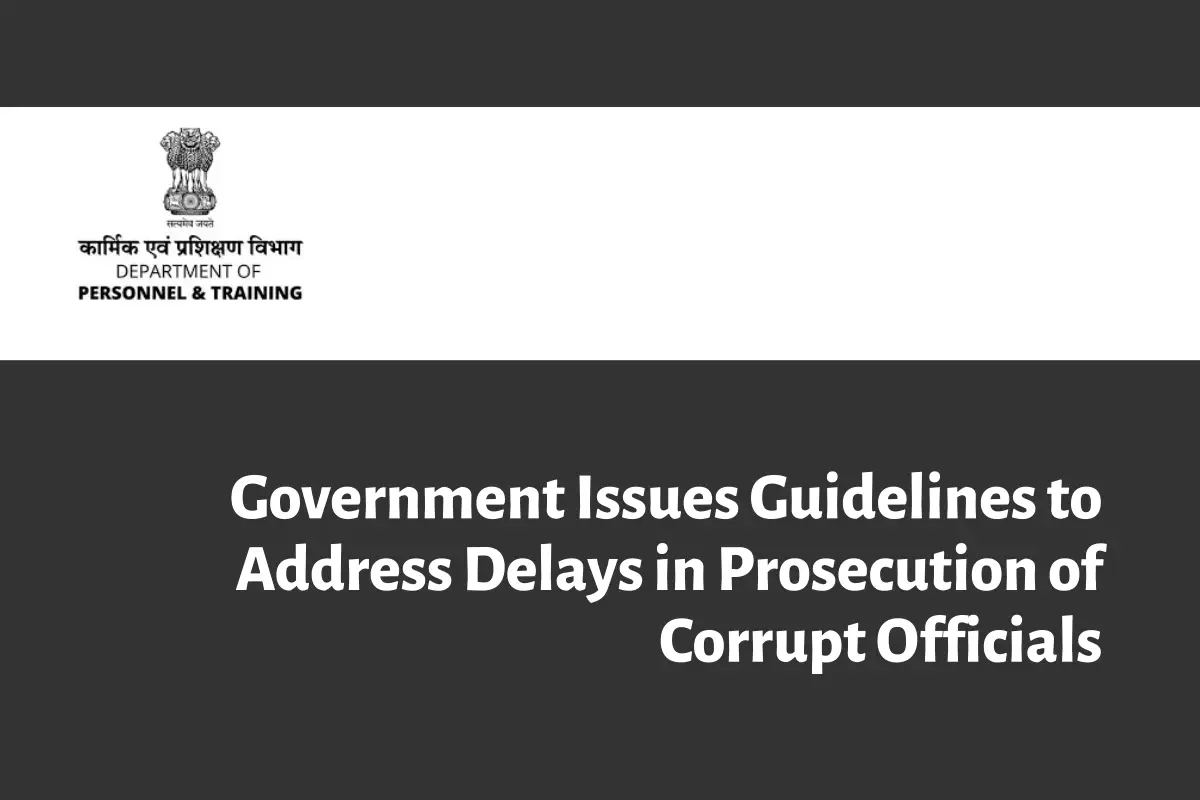Government Urges Swift Action to Address Delays in Prosecution Sanctions for Public Servants

The Government of India has issued comprehensive instructions to streamline the processing of prosecution sanctions for public servants under Section 19 of the Prevention of Corruption Act, 1988, amended in 2018. The Department of Personnel and Training (DoPT) has emphasized the need to eliminate unnecessary delays, ensuring swift action in cases of alleged corruption involving public officials.
Amendments to the Prevention of Corruption Act, 1988
The Prevention of Corruption Act, 1988 was amended in 2018, and these changes have brought new provisions that emphasize timely action in granting sanctions for prosecution. The amendments include the following key aspects:
- Sanction for Retired Officials: Sanction for prosecution is now required even for those individuals who have retired, resigned, or have been transferred from their position.
- Prosecution Initiated by Private Persons: Individuals, not necessarily part of a law enforcement or investigative agency, can also seek prosecution, provided they follow the due procedure as laid down in the amended law.
- Timeline for Decision Making: Authorities are mandated to decide on the proposals within three months of receipt, with an additional one-month extension allowed if legal consultation is needed.
Consolidated Instructions to Streamline Processes
To ensure consistency and eliminate confusion, the DoPT has consolidated the guidelines for processing requests related to sanctioning prosecution. These instructions are aimed at ensuring that all concerned authorities adopt a uniform approach, including the Central and State Governments, as well as investigating agencies.
The consolidated instructions include:
- Action Points for Investigating Agencies: Agencies must obtain necessary approvals and ensure all comments from related authorities are attached to the Investigation Report.
- Single Window Procedure: A designated officer must be assigned to receive proposals, ensuring that they undergo proper scrutiny. Any incomplete proposals will be returned to address deficiencies.
- Checklist for Required Documentation: Authorities must ensure that the checklist for submitting prosecution proposals is duly followed to avoid delays.
- Legal Consultation: Authorities can seek legal consultation to handle complex cases, with an additional month allowed for legal scrutiny.
- Speaking Order Issuance: A formal “speaking order” must be issued, ensuring the decision is clear and well documented.
Mechanisms to Monitor and Avoid Delays
The competent authorities have been advised to implement mechanisms to track delays and ensure adherence to timelines laid down under Section 19 of the Prevention of Corruption Act. The instructions are meant to create accountability at every stage of the process and to expedite decision-making, which is critical to uphold the integrity of public service.
Proposals from Private Persons
The government also highlighted the parameters for processing proposals received from private individuals seeking prosecution of public servants under the Prevention of Corruption Act. These proposals must be accompanied by certified copies of court orders establishing merit and directing the need for prosecution. Additionally, the relevant administrative authority, where the public servant was employed during the alleged commission of the offense, must also receive the proposal for further action.
Key Takeaways:
- Unified Approach: The instructions ensure all agencies and authorities follow a consistent approach, avoiding ambiguity.
- Timelines and Accountability: By mandating specific timelines, the government aims to create a more accountable process for prosecution sanctions.
- Empowering Private Individuals: The new guidelines make it possible for private individuals to initiate prosecution, thereby fostering greater transparency and accountability in governance.
Government’s Appeal for Strict Compliance
The DoPT has urged all Administrative Authorities, including Ministries and State Governments, to adhere strictly to these instructions. These guidelines have been issued to ensure there are no undue delays and to expedite the process of sanctioning prosecution against public servants accused of corruption. Authorities have been asked to give wide publicity to these consolidated instructions and ensure compliance at all levels, including subordinate and autonomous bodies.
By reinforcing a transparent, time-bound process, the government aims to build trust in its anti-corruption framework, ensuring that those who misuse their position are held accountable.
Read the full instructions in the official letter below:
 Loading…
Loading…




